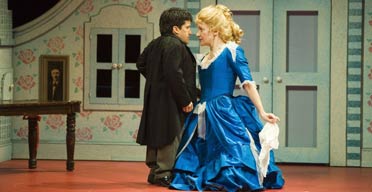A friend of mine recently brought this blog post to my attention and I had some… colorful things to say about it. Since I am a blogger and firmly believe that a vital function of the internet is to abet and continue important conversations, I would like to voice some of my more coherent thoughts.
A few of these points are very valid. Point one, for instance, is something that I struggle with every day… but not in the way described by tenureshewrote. In academia, a lot of our work is done via e-mail. In a globalized field, the internet makes possible projects and conversations which otherwise would be very difficult. That said, figuring out the proper e-mail salutation is fraught with peril; do I address this person as “Doctor” or “Professor”? I’m on first name basis with important person X, but since e-mail is a written medium does that mean I should address her more formally? In contacting a department admin, what is the proper e-mail salutation to give respect but not seem condescending? I see my students struggle with this as well; my department runs on a first-name basis and, accordingly, to them I am “Danielle”. Their e-mail salutations are always deferential, but often edge into the reverential (for the record, they usually go with “Professor Rosvally” especially if they are winding up to deliver bad news). Defaulting to the most respectful title available is always a safe bet.
I have two large-scale issues with this list: the first being that it oversteps the boundary

side-note: check out this rainbow I saw on Friday!
between “personal” and “professional”. There are a few borderline cases of this (see: item six which, for me, brings into question whether everything held in the workplace is automatically a professional function… I tend to think yes but an argument could certainly be launched in the other direction). There are a few that are blatant attempts to dictate life choices (items nine and eight specifically). Chore division at home has absolutely nothing to do with the workplace and, frankly, is no one’s business but the homemakers. Including items like this in a list directed at the workplace not only further blurs the already-hazy boundaries between an academic’s “home” and “work” life, but it also encourages an attitude about the lifestyle. As an academic, it is difficult to turn off at the end of the day. I work from home a great deal, set my own hours for the most part, and since we live in a digital world my e-mail is always by my side via my smart phone. Ensuring that I am not constantly “on duty” is already a mammoth task without the kind of bleed-over this list exhibits.
The second large-scale issue I find with the list is that most of its points fall into the doctrine of “don’t be a jerk”. Point four, for instance, violates every rule of professionalism in anyone’s book no matter what profession you happen to be in. It is not appropriate to have sexually-charged conversations at your workplace/with your co-workers. Point fourteen is just a good general life rule. These things are not items which male academics must particularly be aware of so much as codes of decent living. They have nothing to do with a chosen vocation or sexual equality but rather should be a part of living a do-unto-others lifestyle.
In addition to the large-scale troubles I find here, there are a few specific points that I take real issue with. Point seventeen, for instance, takes a good concept too far. Yes, equal opportunity is important in the workplace, but telling male academics to be careful whom they include when they go for after-work drinks because this is a valuable networking opportunity crosses a line.
First of all. As an academic, part of my job is to network. By encouraging my male colleagues to extend special invitations to me which they wouldn’t otherwise extend potentially puts me in the situation of being around a group of people who have already judged me as inferior and, thereby, do not want to speak with me. If I can’t get that invitation to drinks on my own merit as a scholar/person rather than by some hidden code of my gender, then I don’t really want it. And I absolutely don’t want an invite simply because a group of male coworkers needs a token Girl with them at Guy’s night.
By treating the work of female academics as precious or special, we create a scenario where that work becomes different from the work of our male colleagues. The value of my scholarship has nothing to do with my gender (or the color of my skin, or my sexual orientation for that matter). I don’t believe it’s right to treat my paper any differently from that of a man simply on the basis of field demographics. By giving this kind of special attention to the fact that I might be a woman in a predominately male field, it in turn creates that kind of special attention. Why should the gender of panel-speakers matter if they are equally qualified experts? The best people for the job should be given the job (even if, in this case, “the job” is likely a volunteer service to the industry). When last I checked, hiring an employee based on gender discrimination was very illegal, why should this be any different?
It is true that the academy is facing a disproportionately large number of women in professional service positions. This is a problem for several reasons; two of the largest are: 1) These positions are generally volunteer-based and pile atop any paid position the holder also has. This means that female academics are unfairly burdened with more work for less pay. 2) These positions take a great deal of time and care that otherwise could go towards research (which essentially means that men in the profession have more time to conduct research on the kinds of projects that tend to weigh heavier in job and tenure applications than even high-end professional service). This demographic tangle means, at its core, that female academics may have fewer hiring and promotion opportunities because they do the kinds of service that are required to keep important functions of the academy running. Gender dynamics in the ivory tower is a complicated issue and untangling it isn’t as simple as weeding out benevolent sexism or “mansplaining”.
Generally, my take-away from the tenureshewrote list is that we need to encourage, above all, a doctrine of be a good person. Presumably we all got into this gig to be educators and, in some small fashion, to shape the future by way of our students. If we ever want to function in a society where sexism is no longer newsworthy, we have to be the kinds of people who don’t see sexism as newsworthy. Most of all, we need to treat each other with respect regardless of gender, not because of gender.



 entire play takes place inside the doll’s house, what was the world like outside the doll’s house? Were the characters as they were only within the doll’s house and did they mystically become something different outside? Was this really a world where all the men are short of stature and women are nothing more than pretty little animals attending to them? Did the doll’s house somehow show us the essence of a human being Richard III style and clear our minds of all accessory which may prevent us from seeing the truth of what was going on?
entire play takes place inside the doll’s house, what was the world like outside the doll’s house? Were the characters as they were only within the doll’s house and did they mystically become something different outside? Was this really a world where all the men are short of stature and women are nothing more than pretty little animals attending to them? Did the doll’s house somehow show us the essence of a human being Richard III style and clear our minds of all accessory which may prevent us from seeing the truth of what was going on?